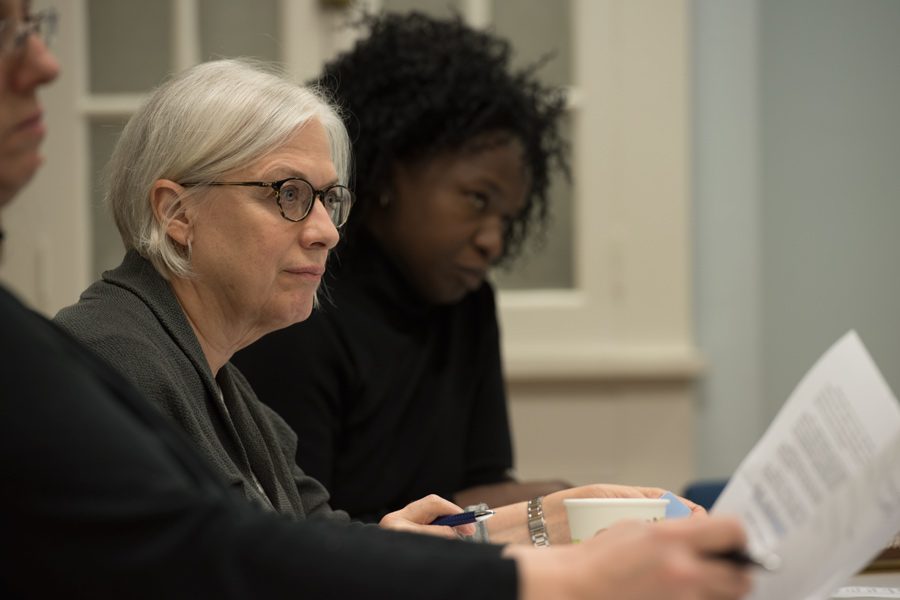CARP Implementation Task Force talks environmental justice, ARPA funding
Daily file photo by Allie Goulding
Jerri Garl at an Environment Board meeting in November 2017. She gave a presentation Wednesday night regarding how CARP-related projects could fit into city ARPA allocations.
October 17, 2021
Ahead of Monday’s City Council meeting and with a potential heap of federal pandemic relief funding on the table, Evanston’s environmental advocacy task force discussed Wednesday how to allocate budget dollars earmarked for economic recovery toward local environmental justice goals.
Evanston’s Climate Action and Resilience Plan aims for the city to reach net-zero carbon emissions by 2050. The CARP Implementation Task Force is in charge of implementing broad policy plans to help the city achieve this goal. It also sets smaller, more specific benchmarks to ensure Evanston stays on track over the next few decades, such as transitioning to 50% electric vehicles by 2025.
Advocates have expressed concern that CARP lacks the funding and staff power necessary to stay on track. The city’s proposed 2022 budget represents an increase of nearly $60 million over 2021’s budget, most of which will come from the American Rescue Plan Act. That means this year is particularly crucial for setting aside CARP funds.
The task force proposed at last week’s council that $5 million in ARPA funding should go toward CARP-centered projects over the next five years. But the federal government does not recognize CARP initiatives as a preset category for ARPA fund use. ARPA can fund environmental initiatives, but it’s specifically designated to foster public health and economic recovery — not necessarily carbon neutrality projects.
So, Interim City Manager Kelley Gandurski recommended implementing CARP projects within existing ARPA categories, rather than allocating the money directly. Wednesday’s task force meeting focused on addressing this caveat by searching for ARPA categories that are feasible for CARP projects.
Jerri Garl, a member of Evanston’s Environment Board and Citizens’ Greener Evanston, led a presentation about ways to connect economic recovery efforts with CARP initiatives. Expanding green space and upgrading clean water infrastructure were among Garl’s recommendations.
The ARPA Interim Final Rule allows for environmental projects to receive federal funding if they meet certain criteria from the U.S. Environmental Protection Agency’s Clean Water State Revolving Fund.
“You kind of have to dig to find these opportunities, but they are there,” Garl said.
Eligible projects for the fund include improving stormwater systems, a focus board member Joel Freeman said is particularly important to Evanston neighborhoods with a high concentration of affordable housing.
“Communities which have been financially impacted by COVID … will also be some of the same citizens that are going to be affected by the effects of climate change,” Freeman said.
Citizens’ Greener Evanston member Hal Sprague agreed, saying local flooding due to climate change often occurs in primarily low-income areas where necessary upgrades and repairs have not been completed.
ARPA will fund a broad list of environmental-related projects when they pertain to Qualified Census Tracts. Those tracts are areas where 50% of households have incomes below 60% of the Area Median Gross Income or have a poverty rate of at least 25%.
Evanston’s 5th Ward qualifies as a QCT and certain areas within the 8th Ward could also receive identification.
“If you’re in those areas, you can justify (CARP) projects that support healthy living environments and neighborhoods conducive to mental and physical wellness,” Garl said.
The task force also wants to attain more city funding for CARP so the project doesn’t entirely rely on ARPA funds. The proposed 2022 city budget currently allots about $80,000 toward CARP projects.
Leading into Monday’s City Council meeting, the task force plans to present councilmembers with a few examples of how economic and environmental justice intersect in the Evanston community. They hope the presentation will lead to higher funding allocations for CARP projects in the final budget.
“(CARP) is fundamentally the most important project coming up,” Garl said. “And if it’s not in the city budget … I think we’re really in trouble.”
Email: jorjasiemons2024@u.northwestern.edu
Twitter: @JorjaSiemons
Email: lilycarey2025@u.northwestern.edu
Related Stories:
— Council discusses American Rescue Plan Act funds, CARP allocations
— CARP transportation plans should address environment, not just climate, organizers say
— Emphasizing climate-friendly buildings, City Council accepts CARP update



